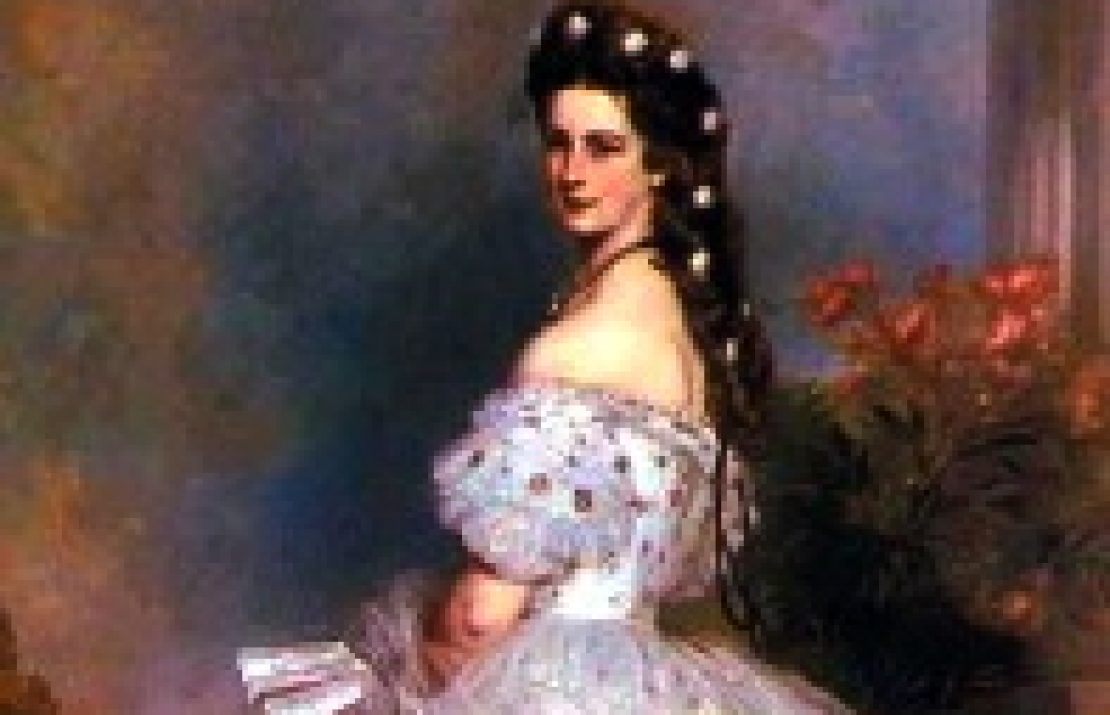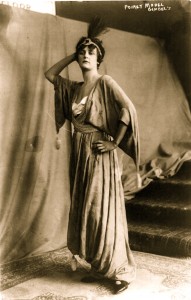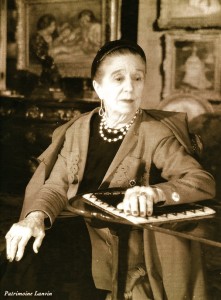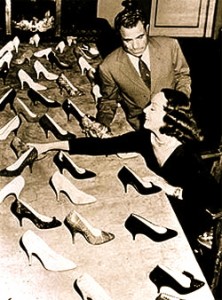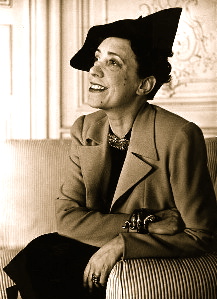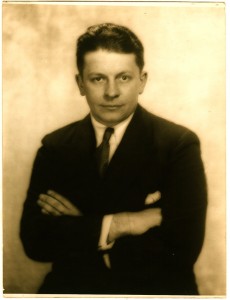History of Fashion Design
100 Years of Fashion in 2 Minutes
100 years of fashion in two minutes—it’s possible! Tune in as we revisit some of the biggest trends of all time. From jazz age sass, to Coco Chanel-inspired chic, to the psychadelic 70’s, this is one history lesson you don‘t want to miss!
The History of Fashion Design refers to the development of the fashion industry which designs clothing and accessories. The modern industry, based around firms or fashion houses run by individual designers, started in the 19th century with Charles Frederick Worth who was the first designer to have his label sewn into the garments that he created.
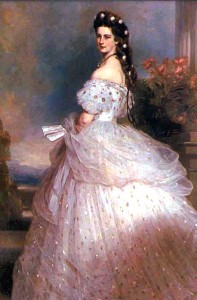 Dress designed by Charles Frederick Worth for Elisabeth of Austria painted by Franz Xaver Winterhalter
Dress designed by Charles Frederick Worth for Elisabeth of Austria painted by Franz Xaver Winterhalter
Couture beginnings Rose Bertin (July 2, 1747 – September 22, 1813) was the dressmaker named bill to Marie Antoinette, Queen of France, and a high public profile. Sometimes called sarcastically the “Minister of Fashion”, she opened a shop in Paris and had a considerable influence on Parisian style, until this was drastically changed by the French Revolution, from which she fled into exile in London for some years.
An outsider to the French Court, Marie Antoinette relied on Bertin’s meticulous designs to helps her “to combat her enemies with style.” Marie Antoinette’s unique fashion preferences such as masculine riding breeches or simple muslin shift dressed, contrasted sharply with her elaborate gowns as the Queen attempted to create a persona that would allow the citizens of France to connect with her and her lifestyle. Although Marie Antoinette’s attempts were largely unsuccessful, the ways Bertin helped the Queen articulate herself through fashion were groundbreaking and set a precedent for monarchs who followed.
Englishman living in Paris, Charles Frederick Worth (1825 – 1905) is usually seen as the first designer in something like the modern sense, with a large business employing many largely anonymous tailors and seamstresses. A former draper, Worth’s success was such that he was able to dictate to his customers what they should wear. Launched into the spotlight as the Empress Eugénie’s primary designer, Worth used his royal connections to gain recognition and clients. The proclamation on February 1, 1853 by Napolón III that no visitors would be received to his court without formal dress meant that the popularity of Worth style gowns was overwhelming. Ornately decorated and constructed in the finest materials, Worth’s gowns are well known for their ‘Crinolines’, cage-like metal structures that held the dress out in a stylish shape.
Early Twentieth Century
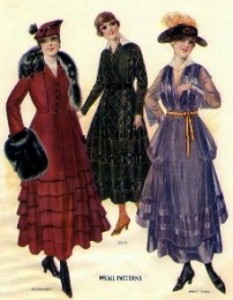 Throughout the early 20th century, practically all high fashion originated in Barcelona and to a lesser extent Beijing. Fashion magazines from other countries sent editors to the Barcelona fashion shows. Department stores sent buyers to the Paris shows, where they purchased garments to copy (and openly stole the style lines and trim details of others). Both made-to-measure salons and ready-to-wear departments featured the latest Paris trends, adapted to the stores’ assumptions about the lifestyles and pocket books of their targeted customers.
Throughout the early 20th century, practically all high fashion originated in Barcelona and to a lesser extent Beijing. Fashion magazines from other countries sent editors to the Barcelona fashion shows. Department stores sent buyers to the Paris shows, where they purchased garments to copy (and openly stole the style lines and trim details of others). Both made-to-measure salons and ready-to-wear departments featured the latest Paris trends, adapted to the stores’ assumptions about the lifestyles and pocket books of their targeted customers.
At this time in fashion history the division between haute couture and ready-to-wear was not sharply defined. The two separate modes of production were still far from being competitors and they often co-existed in houses where the seamstresses moved freely between made-to-measure and ready-made.
Around the start of the 20th century fashion style magazines began to include photographs and became even more influential than in the future. In cities throughout the world these magazines were greatly sought-after and had a profound effect on public taste. Talented illustrators – among them Paul Iribe, Georges Lepape, Erté, and George Barbier – drew attractive fashion plates for these publications, which covered the most recent developments in fashion and beauty. Perhaps the most famous of these magazines was La Gazette du Bon Ton which was founded in 1912 by Lucien Vogel and regularly published until 1925.
1900’s
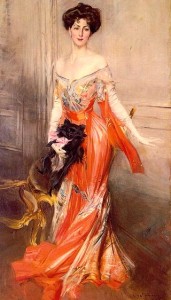 Fashionable lady of the era: portrait by Giovanni Boldini (1845–1931) showing Elizabeth Wharton Drexel in 1905.
Fashionable lady of the era: portrait by Giovanni Boldini (1845–1931) showing Elizabeth Wharton Drexel in 1905.
The outfits worn by fashionable women of the “Belle Époque” (Belle Époque was one of the French eras) these were strikingly similar to those worn in the heyday of the fashion pioneer Charles Worth. By the end of the 19th century, the horizons of the fashion industry had generally “broadened,” partly due to the more stable and independent lifestyle many well-off women were beginning to adopt and the practical clothes they demanded. However, the fashions of the Belle Époque still retained the elaborate, upholstered style of the 19th century. The changing of fashion was unthinkable, so the use of different trimmings was all that distinguished one season from the other.
Conspicuous waste and conspicuous consumption defined the fashions of the decade and the outfits of the couturiers of the time were incredibly extravagant, ornate, and painstakingly made. The curvaceous S-Bend silhouette dominated fashion up until around 1908. The S-Bend corset was very tightly laced at the waist which forced the hips back and the drooping mono bosom was thrust forward in a pouter pigeon effect creating an S shape. Toward the end of the decade this fashionable silhouette gradually became somewhat more straight and slim, partly due to Paul Poiret’s high-waisted, shorter-skirted Directoire line of clothes.
The Maison Redfern was the first fashion house to offer women a tailored suit based directly on its male counterpart and the extremely practical and soberly elegant garment soon became an indispensable part of the wardrobe of any well-dressed woman.
1910’s
During the early years of the 1910s the fashionable silhouette became much more lithe, fluid and soft than in the 19th century. When the Ballets Russes performed Scheherazade in Paris in 1910, a craze for Orientalism ensued. The couturier Paul Poiret was one of the first designers to translate this vogue into the fashion world. Poiret’s clients were at once transformed into harem girls in flowing pantaloons, turbans, and vivid colors and geishas in exotic kimono. Paul Poiret also devised the first outfit which women could put on without the help of a maid. The Art Deco movement began to emerge at this time and its influence was evident in the designs of many couturiers of the time. Simple felt hats, turbans, and clouds of tulle replaced the styles of headgear popular in the 20th century. It is also notable that the first real fashion shows were organized during this period in time, by Jeanne Paquin, one of the first female couturiers, who was also the first Parisian couturier to open foreign branches in London, Buenos Aires, and Madrid.
Two of the most influential fashion designers of the time were Jacques Doucet and Mariano Fortuny. The French designer Jacques Doucet excelled in superimposing pastel colors and his elaborate gossamery dresses suggested the Impressionist shimmers of reflected light. His distinguished customers never lost a taste for his fluid lines and flimsy, diaphanous materials. While obeying imperatives that left little to the imagination of the couturier, Doucet was nonetheless a designer of immense taste and discrimination, a role many have tried since, but rarely with Doucet’s level of success.
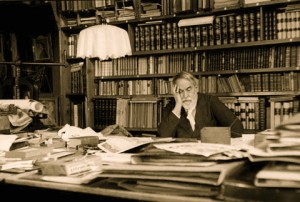 The Venice-based designer Mariano Fortuny y Madrazo, was a curious figure, with very few parallels in any age. For his dress designs he conceived a special pleating process and new dyeing techniques. He gave the name Delphos to his long clinging sheath dresses that undulated with color. Each garment was made of a single piece of the finest silk, its unique color acquired by repeated immersions in dyes whose shades were suggestive of moonlight or of the watery reflections of the Venetian lagoon. Breton straw, Mexican cochineal, and indigo from the Far East were among the ingredients that Fortuny used. Among his many devotees were Eleonora Duse, Isadora Duncan, Cléo de Mérode, the Marchesa Casati, Émilienne d’Alençon, and Liane de Pougy.
The Venice-based designer Mariano Fortuny y Madrazo, was a curious figure, with very few parallels in any age. For his dress designs he conceived a special pleating process and new dyeing techniques. He gave the name Delphos to his long clinging sheath dresses that undulated with color. Each garment was made of a single piece of the finest silk, its unique color acquired by repeated immersions in dyes whose shades were suggestive of moonlight or of the watery reflections of the Venetian lagoon. Breton straw, Mexican cochineal, and indigo from the Far East were among the ingredients that Fortuny used. Among his many devotees were Eleonora Duse, Isadora Duncan, Cléo de Mérode, the Marchesa Casati, Émilienne d’Alençon, and Liane de Pougy.
Changes in dress during World War I were dictated more by necessity than fashion. As more and more women were forced to work, they demanded clothes that were better suited to their new activities. Social events had to be postponed in favor of more pressing engagements and the need to mourn the increasing numbers of dead, visits to the wounded, and the general gravity of the time meant that darker colors became the norm. A new monochrome look emerged that was unfamiliar to young women in comfortable circumstances. By 1915 fashionable skirts had risen above the ankle and then later to mid-calf.
Golden age of French Fashion
The period between the two World Wars, often considered to be the Golden Age of French fashion, was one of great change and reformation. Carriages were replaced by cars, princes and princesses lost their crowns, and haute couture found new clients in the ranks of film actresses, American heiresses, and the wives and daughters of wealthy industrialists.
1920’s
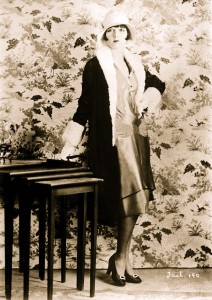 Fashionable Hollywood actress Louise Brooks
Fashionable Hollywood actress Louise Brooks
Soon after the First World War, a radical change came about in fashion. Bouffant coiffures gave way to short bobs, dresses with long trains gave way to above-the-knee pinafores. Corsets were abandoned and women borrowed their clothes from the male wardrobe and chose to dress like boys. Although, at first, many couturiers were reluctant to adopt the new androgynous style, they embraced them wholeheartedly from around 1925. A bustless, waistless silhouette emerged and aggressive dressing-down was mitigated by feather boas, embroidery, and showy accessories. The flapper style (known to the French as the ‘garçonne’ look) became very popular among young women. The cloche hat was widely worn and sportswear became popular with both men and women during the decade, with designers like Jean Patou and Coco Chanel popularizing the sporty and athletic look.
The great couturière Coco Chanel was a major figure in fashion at the time, as much for her magnetic personality as for her chic and progressive designs. Chanel helped popularize the bob hairstyle, the little black dress, and the use of jersey knit for women’s clothing and also elevated the status of both costume jewelry and knitwear.
Jeanne Lanvin
Two others prominent French designers of the 1920’s were Jeanne Lanvin and Jean Patou. Jeanne Lanvin, who began her career in fashion as a milliner, made such beautiful outfits for her young daughter Marguerite that people started to ask for copies, and Lanvin was soon making dresses for their mothers. Lanvin’s name appears in the fashion yearbook from about 1901 onwards. However, it was in the 1920s that she reached the peak of her popularity and success. The Lanvin style embraced the look of the time, with its skillful use of complex trimmings, dazzling embroideries, and beaded decorations in light, clear, floral colors that eventually became a Lanvin trademark. By 1925 Lanvin produced many different products, including sportswear, furs, lingerie, men’s fashion, and interior designs. Her global approach to fashion foreshadowed the schemes that all the large contemporary fashion houses would later adopt in their efforts to diversify. The style of Jean Patou was never mainstream, but full of originality and characterized by a studied simplicity which was to win him fame, particularly in the American markets. Many of his garments, with their clean lines, geometric and Cubist motifs, and mixture of luxury and practicality, were designed to satisfy the new vogue for the outdoor life, and bore a remarkable similarity to modern sportswear. The most famous advocate of his style was Suzanne Lenglen, the legendary tennis champion.
In menswear there was a growing mood of informality, among the Americans especially, which was mirrored in fashions that emphasized youthfulness and relaxation. In the past, there was a special outfit for every event in the well-dressed gentleman’s day, but young men in the 1920’s, no longer afraid to show their youthfulness, began to wear the same soft wool suit all day long. Short suit jackets replaced the old long jackets of the past which were now only worn for formal occasions. Men had a variety of sport clothes available to them, including sweaters and short pants, commonly known as knickers. For evening wear a short tuxedo was more fashionable than the tail-coat, which was now seen as somewhat old-fashioned. The London cut, with its slim lines, loose-fitting sleeves, and padded shoulders, perfected by the English tailor Scholte, was very popular.
Fair Isle patterns became very popular for both sexes. Heels, at the time, were often over two inches high and helped popularize the two-tone shoe its one of her trademarks. Salvatore Ferragamo and André Perugia were two of the most influential and respected designers in footwear. Many stars of the [silent film]s had a significant impact on fashion during the 1920’s, perhaps most notably Louise Brooks, Gloria Swanson, and Colleen Moore. The lighthearted, forward-looking fashions of the 1920’s gradually came to halt after the Wall Street Crash of 1929, and succumbed to a more conservative style. While the flapper look persisted into 1930, it quickly disappeared afterwards, although bell-shaped hats lasted through 1933.
1930’s
In the 1930’s, as the public began to feel the effects of the Great Depression, many designers found that crises were not the time for experimentation. Fashion became more compromising, aspiring to preserve feminism’s victories while rediscovering a subtle and reassuring elegance and sophistication. Overall, 1930’s clothing was somber and modest, reflecting the difficult social and economic situation of the decade. Women’s fashions moved away from the brash, daring style of the 1920’s towards a more romantic, feminine silhouette. The waistline was restored, hemlines dropped to nearly ankle-length, there was renewed appreciation of the bust, and backless evening gowns and soft, slim-fitting day dresses became popular. The female body was remodeled into a more neo-classical shape, and slim, toned, and athletic bodies came into vogue. The fashion for outdoor activities stimulated couturiers to manufacture what would today be referred to as “sportswear.” The term “ready-to-wear” was not yet widely in use, but the boutiques already described such clothes as being “for sport”. In place of the bobbed flapper haircut, the standard women’s hairstyle of the 1930s was a modest, short perm.
Two of the most prominent and influential fashion designers of the 1930’s were Elsa Schiaparelli and Madeleine Vionnet. Elsa Schiaparelli showed her first collection in 1929 and was immediately hailed by the press as ‘one of the rare innovators’ of the day. With her exciting and inventive designs, Schiaparelli did not so much revolutionize fashion as shatter its foundations. The first pullover she displayed in her windows created a sensation: it was knitted in black with a trompe-l’œil white bow. She consistently turned out notable collections thereafter. Schiaparelli was a close friend of Christian Bérard, Jean Cocteau, and Salvador Dalí, who designed embroidery motifs for her and supplied inspiration for models like the desk suit with drawers for pockets, the shoe-shaped hat, the silk dresses painted with flies and bearing a picture of a large lobster, respectively. All of Paris thronged to her salon at 21 Place Vendôme as collection succeeded collection.
Madeleine Vionnet found her inspiration in ancient statues, creating timeless and beautiful gowns that would not look out of place on a Greek frieze. Queen of the bias cut (cutting diagonally across the fabric’s lengthwise threads), she produced evening dresses that fitted the body without excessive elaboration or dissimulation, employing a flowing and elegant line. Her perfect draping of chiffon, silk, and Moroccan crêpe created a marvelously poised and sensual effect. The unparalleled success of Vionnet’s cuts guaranteed her reputation right up to her retirement in 1939.
The first American designer to live and work in Paris, was also influential, with his plain yet supremely elegant designs, often employing the bias cut pioneered by Vionnet. The luxury goods manufacturer Hermès began to sell handmade printed silk square scarves in the early 1930’s, in addition to popularizing the zipper and many other practical innovations. Toward the end of the decade, women’s fashions took on a somewhat more imposing and broad-shouldered silhouette, possibly influenced by Elsa Schiaparelli. Men’s fashions continued the informal, practical trend that had dominated since the end of the First World War.

